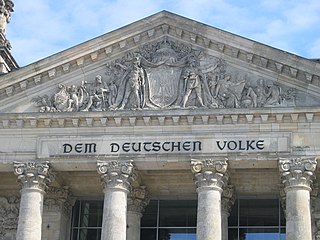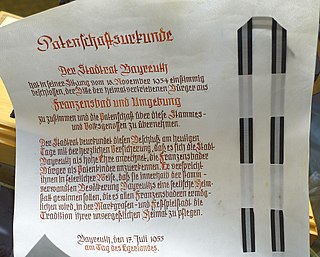The Aryan race is a pseudoscientific historical race concept that emerged in the late-19th century to describe people who descend from the Proto-Indo-Europeans as a racial grouping. The terminology derives from the historical usage of Aryan, used by modern Indo-Iranians as an epithet of "noble". Anthropological, historical, and archaeological evidence does not support the validity of this concept.

In Nazi German terminology, Volksdeutsche were "people whose language and culture had German origins but who did not hold German citizenship." The term is the nominalised plural of volksdeutsch, with Volksdeutsche denoting a singular female, and Volksdeutscher, a singular male. The words Volk and völkisch conveyed the meanings of "folk".

Germans are the natives or inhabitants of Germany, or sometimes more broadly any people who are of German descent or native speakers of the German language. The constitution of Germany, implemented in 1949 following the end of World War II, defines a German as a German citizen. During the 19th and much of the 20th century, discussions on German identity were dominated by concepts of a common language, culture, descent, and history. Today, the German language is widely seen as the primary, though not exclusive, criterion of German identity. Estimates on the total number of Germans in the world range from 100 to 150 million, most of whom live in Germany.

Ferdinand Tönnies was a German sociologist, economist, and philosopher. He was a significant contributor to sociological theory and field studies, best known for distinguishing between two types of social groups, Gemeinschaft and Gesellschaft. He co-founded the German Sociological Association together with Max Weber and Georg Simmel and many other founders. He was president of the society from 1909 to 1933, after which he was ousted for having criticized the Nazis. Tönnies was regarded as the first proper German sociologist and published over 900 works, contributing to many areas of sociology and philosophy. Tönnies, Max Weber, and Georg Simmel are considered the founding fathers of classical German sociology. Though there has been a resurgence of interest in Weber and Simmel, Tönnies has not drawn as much attention.

The Völkisch movement was a German ethnic nationalist movement active from the late 19th century through the dissolution of the German Reich in 1945, with remnants in the Federal Republic of Germany afterwards. Erected on the idea of "blood and soil", inspired by the one-body-metaphor, and by the idea of naturally grown communities in unity, it was characterized by organicism, racialism, populism, agrarianism, romantic nationalism and – as a consequence of a growing exclusive and ethnic connotation – by antisemitism from the 1900s onward. Völkisch nationalists generally considered the Jews to be an "alien people" who belonged to a different Volk from the Germans.
Volksgemeinschaft is a German expression meaning "people's community", "folk community", "national community", or "racial community", depending on the translation of its component term Volk. This expression originally became popular during World War I as Germans rallied in support of the war, and many experienced "relief that at one fell swoop all social and political divisions could be solved in the great national equation". The idea of a Volksgemeinschaft was rooted in the notion of uniting people across class divides to achieve a national purpose, and the hope that national unity would "obliterate all conflicts - between employers and employees, town and countryside, producers and consumers, industry and craft".
The Conservative Revolution, also known as the German neoconservative movement, or new nationalism, was a German national conservative movement prominent during the Weimar Republic and Austria, in the years 1918–1933.

German Christians were a pressure group and a movement within the German Evangelical Church that existed between 1932 and 1945, aligned towards the antisemitic, racist, and Führerprinzip ideological principles of Nazism with the goal to align German Protestantism as a whole towards those principles. Their advocacy of these principles led to a schism within 23 of the initially 28 regional church bodies (Landeskirchen) in Germany and the attendant foundation of the opposing Confessing Church in 1934. Siegfried Leffler was a co-founder of the German Christians.

German nationalism is an ideological notion that promotes the unity of Germans and of the Germanosphere into one unified nation-state. German nationalism also emphasizes and takes pride in the patriotism and national identity of Germans as one nation and one people. The earliest origins of German nationalism began with the birth of romantic nationalism during the Napoleonic Wars when Pan-Germanism started to rise. Advocacy of a German nation-state began to become an important political force in response to the invasion of German territories by France under Napoleon Bonaparte.
Heimat is a German word translating to 'home' or 'homeland'. The word has connotations specific to German culture, German society and specifically German Romanticism, German nationalism, German statehood and regionalism so that it has no exact English equivalent. The word describes a state of belonging "the opposite of feeling alien," and its definition is not limited to a geographical place.

The German noun Volk translates to people, both uncountable in the sense of people as in a crowd, and countable in the sense of a people as in an ethnic group or nation.
The Federal Ministry of Displaced Persons, Refugees and War Victims was part of the West German federal government from 1949 till 1969.
Völkisch nationalism is a German ultranationalist, ethno-nationalist and racial nationalist ideology. It assumes the essentialist design as Völker or Volksgruppen, which are described as closed ethnic-biological and ethnic-cultural units within a hierarchy of such populations. Völkisch nationalism influenced Japanese minzoku nationalism.
Walter Kuhn, was an Austrian-born German folklorist, historian and Ostforscher. Prior to World War II, Kuhn belonged to the German minority in Poland. His academic work specialized in German minorities outside Germany, particularly in the area of Ukraine, especially Volhynia. He focused his research on German language islands. In 1936, Kuhn moved to Germany to take a professorship at the University of Breslau. In 1940, he joined the Nazi Party. During the war, he advised various Nazi plans of ethnic cleansing aimed at Jews, Poles and their replacement by German settlers from further east.

Deutschtum is a German term equating to "Germanness". It may either refer to the German character and spirit, the belonging and yearning to the German people or the entirety of German ethnic groups residing in foreign countries. An anti-Western concept of a romanticized Deutschtum has been an important component of German nationalism, when the conceptions of Volk (people) and Gemeinschaft (community) were driven to their extremes during the Third Reich.
Philosophy of culture is a branch of philosophy that examines the essence and meaning of culture.

Karl Leopold von Möller was an Austrian military officer, author and German nationalist politician. He was born into a military family of the Austro-Hungarian nobility and became a senior general staff officer in the Austro-Hungarian Army, rising to the rank of Oberst (colonel) and regimental commandant. From 1932 to 1933, Möller was the 1st Gauleiter of the Banat. He was an enthusiastic supporter of Adolf Hitler and the Nazi Party and, in 1932, founded the antisemitic newspaper "Der Stürmer" in Timișoara, an imitation of the German Nazi publication.

Volksgenosse is a German language term meaning a fellow member of a community or compatriot. The word was recorded as early as 1798 and its usage grew within the Völkisch movement of German ethnic nationalism, which led to its use to denote a person of the same "blood community". The term became common parlance within the Nazi Party, then the Third Reich, as a way to distinguish ethnic Germans from other groups, such as Jews and Gypsies. Due to these associations, the word gradually fell out of use after Germany's defeat in World War II and subsequent denazification efforts.

Otto Friedrich Wilhelm Stapel, was a German Protestant and nationalist essayist. He was the editor of the influential antisemitic monthly magazine Deutsches Volkstum from 1919 until its shutdown by the Nazis in 1938.
The Volkskörper, literally translated as either "national body" or "body national", was the "ethnic body politic" in German population science beginning in the second half of the 19th century. It was increasingly defined in terms of racial biology and was incorporated into Nazi racial theories. After 1945 the term was largely used synonymously with population in anthropology and geography. In political parlance, however, the Volkskörper served as a metaphor for an organic and biological understanding of the unity between the Volk and the Volksgemeinschaft, its broader society. In German politics during the 19th and 20th centuries, it was used especially in anti-Semitic and racial hygiene texts to semantically differentiate the Volk, conceived as a biological and racial unit, from so-called "parasites", "pests" and "diseases". In this naturalistic sense "excretion" was construed in such a way as to define elements of the population as disease-causing and therefore needing to be expelled. The metaphor of the body national was therefore closely related to the Nazi regime's racial system and justified the enactment of policies like Aktion T4.










